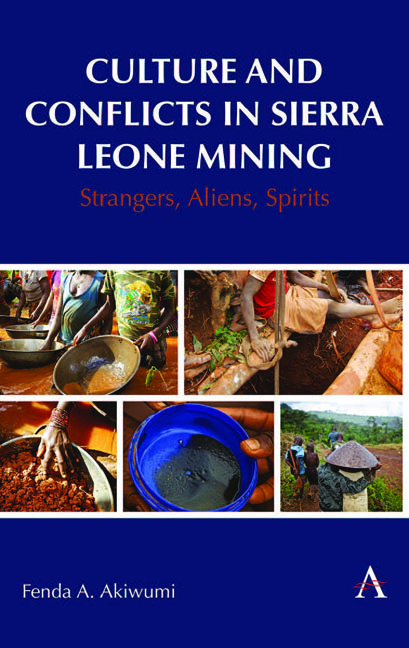Book contents
- Frontmatter
- Dediation
- Contents
- List of Figures and Tables
- Acknowledgements
- Abbreviations
- 1 Introduction: Culture in Commodity Chains
- 2 Sierra Leone’s Global Incorporation Through Mining
- 3 Cultural Difference: Policy and Legislative Dilemmas
- 4 Sacred Places: Local Ontology Meets Global Capital
- 5 Strangers, Environment, and Livelihoods
- 6 Race, Ethnicity, Class, and Gender in Mining
- 7 Between a Rock and a Hard Place
- 8 Conclusion
- References
- Index
- Frontmatter
- Dediation
- Contents
- List of Figures and Tables
- Acknowledgements
- Abbreviations
- 1 Introduction: Culture in Commodity Chains
- 2 Sierra Leone’s Global Incorporation Through Mining
- 3 Cultural Difference: Policy and Legislative Dilemmas
- 4 Sacred Places: Local Ontology Meets Global Capital
- 5 Strangers, Environment, and Livelihoods
- 6 Race, Ethnicity, Class, and Gender in Mining
- 7 Between a Rock and a Hard Place
- 8 Conclusion
- References
- Index
Summary
My goal in this book was to explore cultural dynamics (cultural alienation, cultural hybridity, cultural resistance, and cultural evolution) embedded in a world system commodity chain. I devised a conceptual model combining premises from world systems and postcolonial theories and the landlord– stranger paradigm to analyze and better understand the cultural differences in mining that are a root cause of persistent low-intensity conflicts in extraction areas.
I posed some important guiding questions to support my premise of a culturally unequal exchange: To recap: How does the Sierra Leone government address the cultural differences in land management embedded in mineral commodity chains in policy and law? Is there an asymmetric transfer of cultural resources and norms from core and semi-peripheral countries to peripheral nations? Can this transfer be conceptualized as a culturally unequal exchange? Is “illicit” artisanal mining a form of cultural resistance against the impacts of incorporation on customary land rights? Do cultural resistance and cultural hybridity in Sierra Leone mining areas pose challenges to effective incorporation through mineral commodity chains? Can cultural resistance in the Sierra Leone mining sector trigger a development evolution that moves beyond capitalist extractivism toward new development trajectories that embody African cultural values? Or will the continuing marginalization of African cultural perspectives persist in the face of a capitalist global economy inexorably driving toward cultural universalism?
Operating within the commodity chain are Western cultural concepts of mining governed by state laws and indigenous artisanal mining as a timehonored subsistence livelihood managed by the landlord–stranger institution and power associations. The latter is seen as poorly managed and illicit, a colonial legacy, and the former as legal and economically efficient. The cultural differences and power imbalance in this arrangement have generated low-intensity and persistent conflict situations integral to the mining industry in Sierra Leone since its inception.
The state faces legislative and policy dilemmas, a colonial legacy, in trying to reconcile customary land management—the landlord–stranger relationship—with Western notions of mining land use. There have been rapid changes in policies and laws to facilitate mineral extraction amid cultural conflicts. Mining multinationals are privileged and powerful strangers through state laws.
- Type
- Chapter
- Information
- Culture and Conflicts in Sierra Leone MiningStrangers, Aliens, Spirits, pp. 115 - 118Publisher: Anthem PressPrint publication year: 2024



